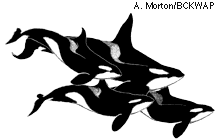Helping the Whales Compiled by Jackie Hildering
The following is intended to provide direction in what we all can do reduce stresses to whales as they are serving as ambassadors of the state of marine ecosystems and thereby, the state of the environment at large.
Click here for detailed actions to reduce your impact on the environment.
Believe in our empowerment to make a positive difference and understand that the solutions for whales are the solutions for so many environmental problems. And . . . what is good for whales is good for us!
Realize you do not have to be perfect, just take on more opportunities to reduce consumption of the world’s resources. Become aware of your ecological footprint and work to reduce it.
 nment. Help make sure Persistent Organic Pollutants (POPs) are no longer used nor created. Ensure that governments take on a “cradle to grave” approach to chemicals; that new chemicals must be tested and that manufactures have responsibility for the full life cycle of the chemicals.
nment. Help make sure Persistent Organic Pollutants (POPs) are no longer used nor created. Ensure that governments take on a “cradle to grave” approach to chemicals; that new chemicals must be tested and that manufactures have responsibility for the full life cycle of the chemicals. Recognize and respect our connectedness to nature and stimulate this in others - especially today’s children.
Understand that the majority of current media, businesses and governments operate in accordance with the oil and gas paradigm. Therefore, a shift towards choices better for the environment, literally costs them making them resistant to change.
Live with precaution, using your power as a consumer and voter to ensure that we find out first if practices are dangerous to the environment before we proceed with them.
Further action:
Become informed about the stresses whales endure (as indicators of the state of the environment).
-
Noise (includes impacts of low / mid frequency sonar)
-
-
Land to sea transfer of pathogens (i.e. marine mammals getting diseases originating in terrestrial animals)
Support research and conservation organizations. Examples: Wild Killer Whale Adoption Programme and organizations listed here.
